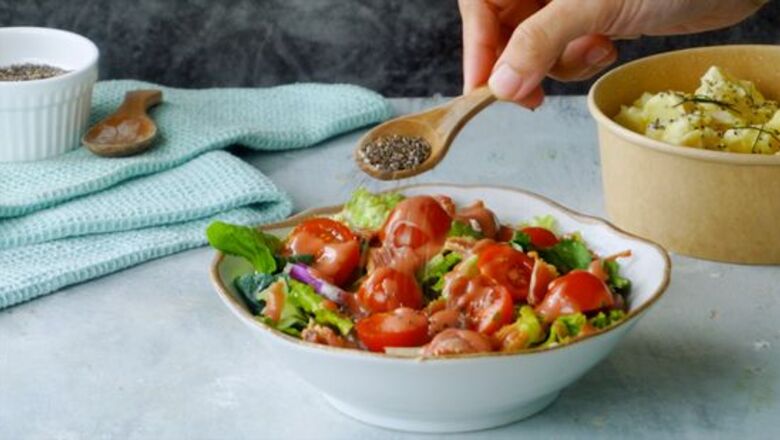
views
Ways to Eat Chia Seeds
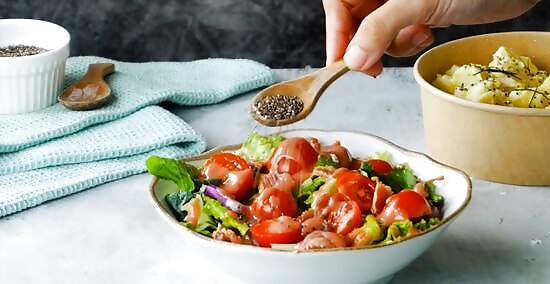
Chia seeds as a topping One of the easiest ways to incorporate more chia seeds into your diet is to use them as a topping or garnish. Simply sprinkle 1 tbsp (15 g) of chia seeds over your oatmeal, cereal, or yogurt. You can even add them to garnish savory dishes, such as salads or soups. They have such a mild taste that they’ll be barely noticeable, except for the small bit of added crunch. Just 1 tbsp (15 g) of chia seeds as a garnish adds 3 grams of protein and 5 grams of fiber to your dish!
Chia pudding Chia pudding is another popular option. It’s super easy to make, and you can also get creative with your toppings and add-ins. Here’s a basic chia pudding recipe: Add 1.5 cups (375 g) of the milk of your choice to a mixing bowl. Non-dairy milks like almond or coconut milk are great options, but you can also use regular milk if you prefer. Add in 1/2 cup (125 g) of chia seeds, 1 teaspoon (4.9 mL) vanilla extract, and 1–2 tablespoons (15–30 mL) of maple syrup depending on how sweet you want your pudding to be. Whisk everything together until combined. Cover the bowl and refrigerate overnight, or at least 6 hours. Eat your chilled chia pudding as is, or top with fresh fruit, fruit compote, nuts, cacao nibs, granola, or any other topping you enjoy!
Chia overnight oats Overnight oats are a quick and easy make-ahead breakfast option. Adding chia seeds into the mix ups the nutritional value of the dish, and it also helps create a thicker, pudding-like texture. Here’s how to make them: Add 1 cup (240 mL) of almond milk, 1/2 cup (125 g) rolled oats, 1/2 of a banana (mashed up), and 1 tbsp (15 g) of chia seeds to a 1-pint jar. Mix everything together until combined, or just put the lid on the jar and shake everything up. Refrigerate overnight (about 8 hours), or until the chia seeds have fully expanded and the mixture is thickened and gel-like.
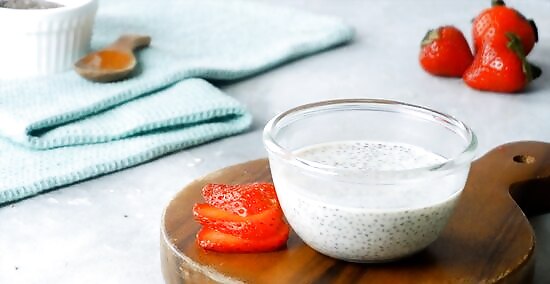
Chia porridge Chia porridge is a yummy and easy-to-make breakfast food. 1-2 tbsp (15-30 g) of chia seeds into a cup (240 mL) of warm milk or any milk substitute. Let stand for 10–15 minutes until the mixture forms a gel, whisking occasionally to break up seed clumps, then eat cold or heat again before eating. To add flavor, stir in cocoa powder, malt powder, or fruit juice to the mixture while it’s still gelling. You can also add toppings like fresh or dried fruit, nuts, cinnamon, almond butter, honey, or agave. Whatever fix-ins you usually add to oatmeal would be delicious here!
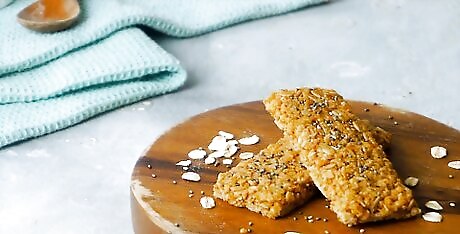
Chia seed granola bars Chia seeds make a great addition to any granola bar recipe. For a no-bake option, stir the seeds into 1 cup (250 g) pitted, blended dates, ⁄4 cup (59 mL) peanut butter or other nut spread, 1.5 cups (375 g) rolled oats, ⁄4 cup (59 mL) cup honey or maple syrup, and 1 cup (250 g) chopped nuts. Spread this mixture on a pan and let it harden in the fridge. You can also toast the oats beforehand to add a toasty flavor!
Chia seed protein balls Add chia seeds to protein balls to pack them full of even more nutrients. Here’s a recipe for delicious peanut butter protein balls: Combine ⁄3 cup (160 mL) oats, 1/4 cup (63 g) shredded coconut, 2 tbsp (30 g) mini chocolate chips, 1 tbsp (15 g) chia seeds, 1 tbsp (15 g) flax seeds, ⁄4 teaspoon (1.2 mL) ground cinnamon, and a pinch of kosher salt in a large bowl. Next, stir in ⁄3 cup (160 mL) peanut butter, 2 tablespoons (30 mL) of honey, ⁄4 teaspoon (1.2 mL) of vanilla extract, and 2 tablespoons (30 mL) of milk. Mix until combined into a slightly crumbly mixture. Use wet hands to roll the mixture into small protein balls, and place them onto a parchment-paper lined baking sheet. Refrigerate for 30 minutes, then enjoy!
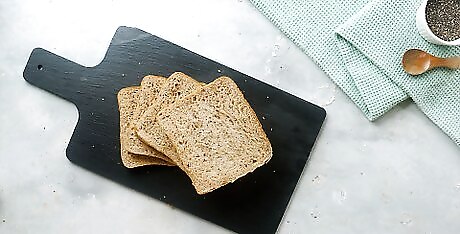
Chia seed baked goods You can add chia seeds to a variety of flour-based baked goods to pack them with nutritional benefits. Scoop 3 tbsp (45 g) of chia seeds into your favorite batters for whole-grain bread, muffins, oatmeal cookies, or cakes, then just bake them as you normally would.
Chia seed in sandwich fillings A tablespoon of chia seeds can easily be added to sandwich fillings such as potato salad, egg salad, or tuna salad to add some nutritional value without affecting the taste too much. 1 tbsp (15 g) of chia adds 3 grams of protein and 5 grams of fiber to the mixture!
Chia seed falafel Because they act as a thickening agent and help hold everything together, chia seeds are commonly found in falafel recipes. Falafels are already packed with protein because they’re made from chickpeas, and adding chia seeds makes them even more rich in protein.
Chia seed stir fry Add 1 tbsp (15 g) of chia seeds when you’re cooking a veggie stir fry to add extra protein, fiber, and omega-3s. Their mild flavor helps them blend in nicely with any combination of ingredients, so you’ll hardly notice them!
Chia guacamole Chia seed guacamole may sound strange, but it's a great way to incorporate chia into your diet if you aren't a fan of the sweeter recipe options. Here’s how to make it: Combine 1 tsp (6 g) of chia seeds with 1.5 cups (375 g) of diced Roma tomatoes and their juice. Set aside and allow the chia to thicken for about 10 minutes. In another bowl, mix together 3 mashed avocados, 1 tsp (6 g) of minced garlic, 1 tsp (6 g) of kosher salt, 2 tbsp (30 g) of chopped fresh cilantro, and 2 tablespoons (30 mL) of lime juice. Finally, add the tomato and chia mixture and mix it all up. Serve with tortilla chips, pita bread, or raw veggies!
Chia seed salad dressing Because chia seeds take on a gel-like consistency when exposed to liquid, you can add them to homemade salad dressings to help thicken them up. Here’s a yummy chia seed salad dressing recipe to try out: Combine ⁄4 cup (59 mL) olive oil, 2 tablespoons (30 mL) lemon juice, 2 tablespoons (30 mL) golden or white balsamic vinegar, 2 teaspoons (9.9 mL) honey or agave, and 2 tsp (12 g) chia seeds in a bowl. Whisk everything together until fully combined, then season with salt and pepper to taste.
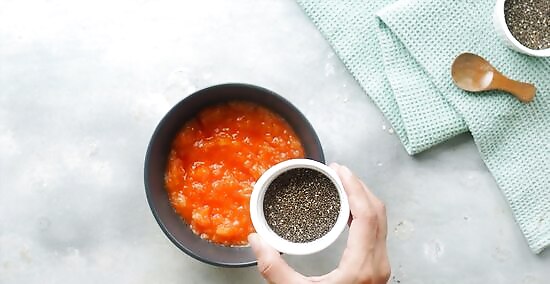
Chia seed jam or jelly Add chia seeds to the pureed fruit of your choice to create a delicious jam or jelly. For strawberry chia jam, add 2 cups (500 g) of strawberries, 3 tbsp (45 g) of chia seeds, 1 tablespoon (15 mL) of maple syrup, and ⁄2 teaspoon (2.5 mL) of pure vanilla extract to a blender or food processor, and blend until smooth. Transfer the mixture to an airtight container and allow it to thicken in the fridge for about 1 hour, and voila! You have a yummy jam to spread on toast, bagels, muffins, and more. More chia seeds in the jam mixture will create a thicker consistency, while fewer chia seeds will create a thinner one. Don’t be afraid to experiment with the ratios to find the one that suits your taste!
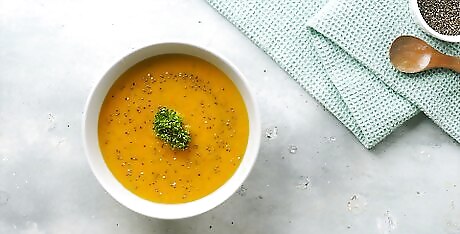
Chia seed soups, sauces & gravies Because chia seeds create a thick, gel-like texture when soaked in liquid, they also make an excellent thickening agent for savory recipes. Add 2-4 tbsp (30-60 g) of chia seeds to any bowl of soup, stew, sauce, or gravy, and then let it sit until it thickens (about 10 to 30 minutes). Make sure to stir occasionally while the mixture is thickening to break up any clumps.
Chia seed meatballs, burgers, or meatloaf Chia seeds also work as a thickening agent for all kinds of ground meat mixtures that typically use breadcrumbs. Just add 1 tbsp (15 g) of chia seeds for each 1 pound (450 g) of ground meat. This is a great way to make a meatball or meatloaf recipe gluten-free, as well!
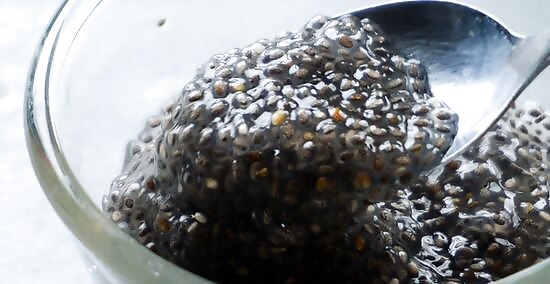
Chia seed gel This chia seed gel can be made in advance and stored in the fridge for up to two weeks. Mix 1 tbsp (15 g) chia seeds with 3–4 tablespoons (44–59 mL) water and let sit for 30 minutes, stirring occasionally, until it forms a thick gel. Then, whenever you want chia seeds in a recipe, just add in a scoop of the gel. This is super convenient, and it also ensures that there are no dry, crunchy seeds when you’re trying to make a soup or smoothie with a smoother texture.
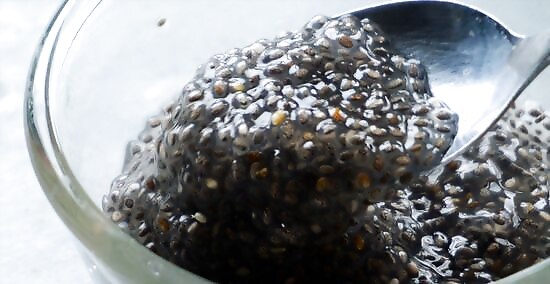
Chia seeds as an egg substitute Chia seed gel makes an excellent substitute for eggs in baked goods. This is a great option if you’re trying to bake something for someone who has an egg allergy or follows a vegan diet. To make the egg substitute, mix 1 tbsp (15 g) chia seeds with 3 by 4 tablespoons (44 by 59 mL) of water. Let it sit for about 10 minutes, stirring occasionally. It should form into a thick gel. This makes roughly one chia “egg,” so multiply the measurements as needed for your recipe. For example, if your recipe called for 2 eggs, you would double these measurements, for 3 eggs you would triple them, and so on. Note: This doesn't work as an egg substitute for omelets, scrambles, or other similar recipes—just baked goods.
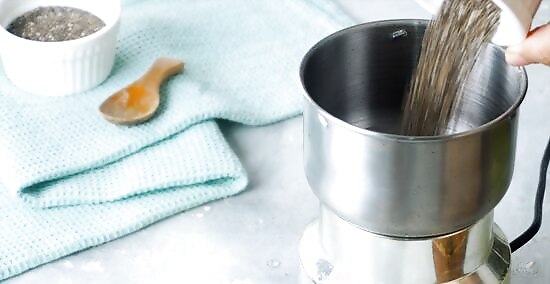
Chia seed flour To make chia seed flour, pulse the seeds in a food processor, blender, or coffee grinder until a fine powder forms. Use it in place of all-purpose flour by substituting it completely or mixing it with other flour. If using it in a thick dough, you can substitute the chia flour in equal parts. If using it in a thinner batter or dough, mix one part chia seed flour with three parts regular or gluten-free flour.
Ways to Drink Chia Seeds
Chia water For a super simple chia beverage option, mix 1 tbsp (15 g) of chia seeds in an 8–10 fluid ounces (240–300 mL) glass of water, and let them soak for a few minutes. Just don’t wait too long—your water may thicken into too much of a gel-like consistency. Add a squeeze of lemon or lime juice for flavor, and that’s it! Be careful not to add too many chia seeds, especially if you’re new to eating them. You can even start with a teaspoon of chia (instead of a tablespoon), to make sure your body tolerates them well.
Chia lemonade or juice If the flavor of chia water is too bland for you, you can also stir 1 tbsp (15 g) of chia seeds into the lemonade or juice of your choice. The added fruity flavor makes it easier to tolerate the texture of a chia beverage, which can be a bit off-putting at first (since the chia seeds create a thicker consistency).
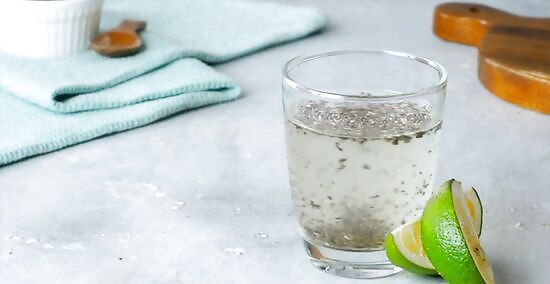
Chia fresca Chia fresca is a refreshing and delicious way to incorporate more chia seeds into your diet. To make it, stir 1 tbsp (15 g) chia seeds into 10 fluid ounces (300 mL) of water. Add the juice of 1 lemon or lime, and sweeten with a small amount of raw honey or agave syrup. Pour into a glass with ice and enjoy!
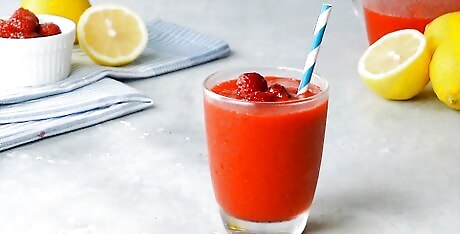
Chia smoothies When preparing any single-serving smoothie or shake, add 1-2 tbsp (15-30 g) chia seeds to the blender or food processor with the other ingredients before blending. The seeds add extra fiber, protein, and omega-3 fatty acids to your smoothie, and they also help create a thicker texture!
Chia tea You can even add chia seeds to hot beverages, like tea! Just brew a cup of your favorite tea as you usually would, then stir in a small spoonful of chia seeds. After a few minutes, they’ll sink to the bottom and start to expand, adding a fun and unique texture to the drink. Any type of tea works, but the nutty flavor of chia goes with black and green teas especially well!
Chia Seed Nutritional Info & Health Benefits
Chia seeds are densely packed with important nutrients. They’re a great source of omega-3 fatty acids, calcium, fiber, antioxidants, vitamins, minerals, and plant-based protein. In fact, in just a 1 fluid ounce (30 mL) serving of chia seeds, you’ll get 4.7 grams of protein and 9.8 grams of fiber. With all of these nutrients, it’s no wonder that chia seeds are such a popular superfood!
The nutrients in chia seeds are associated with many health benefits. Omega-3 fatty acids, for instance, support brain function and heart health, and antioxidants help protect against cancer, diabetes, and Alzheimer’s disease. Chia seeds can also help you get an adequate amount of fiber in your diet, which is associated with a decreased risk of coronary heart disease and type 2 diabetes.
Chia Seed FAQs
What is the correct way to grind chia seeds? For the best results, add your chia seeds to a spice grinder, food processor, or blender, and pulse in short bursts until fully pulverized into a fine powder. You can also use a mortar and pestle if you prefer to grind your chia seeds by hand. Ground chia seeds can be used as a flour substitute, or they can be added to whatever flour you’re using to add extra nutritional value. They can also be added to liquid dishes if you’d rather not use whole chia seeds. This is a great option if you want to avoid changing the texture of the dish too much and make the chia seeds less noticeable.
Should chia seeds be soaked before eating, or can they be eaten dry? It’s safe to sprinkle a small amount of dry chia seeds as a topping on a dishes, but they shouldn’t be eaten on their own. Dry chia seeds start to expand rapidly when they come into contact with liquid (like your saliva), so they can get stuck in your throat and become a choking hazard. To avoid this risk, soak your chia seeds before consuming them, or mix them into other foods like yogurt, smoothies, soups, or sauces.
How much chia is it safe to eat daily? Many people can tolerate small quantities of chia seeds in their diets. Large quantities of chia seeds, however, can cause upset stomach and digestive issues due to their high fiber content. Because of this, it’s best to start out with a small 1 tbsp (15 g) serving of chia seeds to see how your body tolerates them. Luckily, even a small amount of chia seeds includes a ton of nutrients, so you’ll still be able to enjoy their health benefits.
Should anyone avoid eating chia seeds? Those who take medicines for diabetes or hypertension should exercise caution with chia seeds, as they can cause dips in blood sugar. Chia seeds can also cause flare-ups for those who have inflammatory bowel conditions like Crohn’s disease. If you have any of these conditions, consult your doctor before incorporating chia into your diet.



















Comments
0 comment